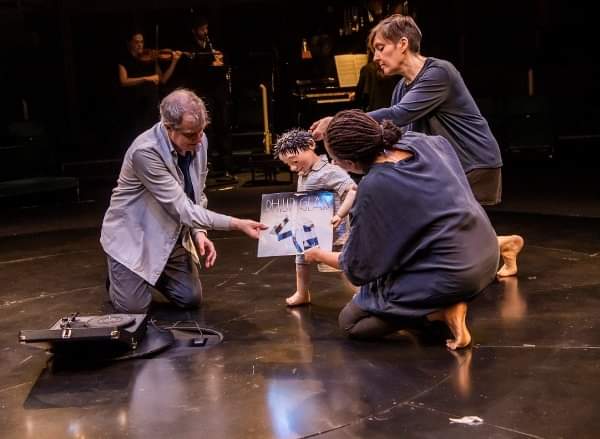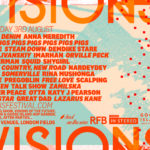Whoa! As a humble music critic I’m getting out of my comfort zone with arty-farty ‘part-concert, part-performance’ events like Tao of Glass, but it’s a story that needs to be told and the thing runs until 20th July, so there’s still time to catch it.
The concept had seemingly the longest gestation period of any of the many productions at the MIF this year, evolving as it went along in Manchester and New York, to tell the story of its own story, created by American composer Philip Glass and the Mancunian born Director-cum-performer/narrator, Phelim McDermott. The two have worked extensively together in the past and it shows; not only in their embrace at the end but in the clockwork timing of music and theatre.
The ‘theatre’ comes courtesy of one man – McDermott – and his 100-minute monologue which ranges over 10 different meditations on life, death and wisdom; three puppeteers from theatre company ‘Improbable’ who redefined that skill for me; the music from a violin, piano, clarinet and drummer ensemble of the highest order (supplemented by Glass himself but more of that later); and the charm from the cutest puppet you ever did see, McDermott’s ‘son’ Ridley.
McDermott kicks the adventure off sitting, spot-lit, in a banquette seat in the front row of this theatre in the round, telling an unforewarned paying theatre-goer sat next to him his life story, starting with his childhood days in Blackley, a northern suburb, and ranging over many of the ‘greats’ who had played the Royal Exchange, where he saw his first play. He ad-libs from the word go (“you’re learning a lot tonight, aren’t you?)
Moving on to his original childhood idea for a puppet show with Glass’s music, it was to be a new version of Maurice Sendak’s controversial 1970 picture book In the Night Kitchen, which featured childhood nudity. But it never happened, owing to Sendak’s untimely demise, the first of many things that ‘never happened’ through the evening.
If you think that’s bizarre the convoluted story set in different time periods gets successively more surreal as it ranges at length over magic kettles; twisty Japanese pots which when fractured are repaired with golden glue which makes them more beautiful by highlighting their flaws (the real life art of Kintsugi); flotation chambers; a £1000 coffee table that gets smashed into pieces by builders (a metaphor for the broken dreams of aspirant actors); the concept of consensus reality (Wiki it!); and what emerges as the central premise, the Tao of Glass.
One of the major themes of Taoism (or Daoism as it is pronounced on stage) is that there are times when you are following nature, and/or working against it in order to find ‘the way’.
And that is what McDermott has to do, aided occasionally by the whispered wisdom of his puppet son, who has some of the best lines, such as that he likes Glass’ music because “it’s calm and dangerous at the same time.”
Apart from manoeuvring Ridley the puppeteers are expert at origami with large pieces of paper covered in musical manuscript (I’ve no idea what it means), folding them rapidly into human shapes (apart from one moment when McDermott fiddles with a paper hoodie “to make the head look more believable”) and demonstrating great dexterity with huge expanses of sellotape unravelled from the dispenser at astonishing speed.
The Taoist ‘way’ here is for McDermott actually to meet Glass in New York in order to discuss his creative ideas at first hand with the great man, which he eventually manages, but not without going first through a ritual of being in a comatose state (which McDermott realistically manages for a full 10 minutes on his back) while a piano plays itself – by way of a device that had been mulled over earlier – to the accompaniment of the ensemble.
Anyone expecting to hear copious amounts of Glass’ trademark ostinatos will be in for a pleasant surprise. Apart from the 10 meditations there are supposed to be 10 new pieces of music but I only heard one. At the end it is being played by the auto piano and the ensemble but as McDermott comes out of his coma, muttering about how he “bored Philip Glass, the man who’s put more people to sleep in concert halls than anyone else” the Great Man himself suddenly appears to join pianist Katherine Tinker in an extended piano four hands session which would have been too damn long (10 minutes at least) were it not so mesmerising.
A quick word about the theatre itself. A performance in the round like this where McDermott can talk to every audience member face-to-face (our eyes made direct contact on half a dozen occasions at least even though I was in an upper tier) will always work better for a production of this nature, in which, as the programme notes say, “you don’t really find out what you’ve done until the audience is sitting there.”
Moreover, the Royal Exchange is blessed with all sorts of gadgetry, such as three hanging concentric circles, which can and do “dance” and which become an integral part of the set (for example permitting, by way of rods inserted in them, the sellotape world championships.
The programme notes make clear that not only will Tao of Glass mean different things to different people and in different places (it did for me, I thought McDermott was dead at the end and that he had failed in his ultimate quest) but that it will unfold more stories the longer it progresses (it will undoubtedly tour, though perhaps not with Glass).
Be warned that it is an emotional piece, towards the conclusion at least because it deals with lifetime journeys and their disappointments; something that everyone can relate to in their own way, and ratcheted up by that extensive piano outro, the simple repeated melody of which implants itself in your memory. A friend, a hard-bitten young Salford landlady who was in the audience without me knowing it, told me today that she had sobbed her heart out at the end.
To the Moon (Laurie Anderson and Hsin-Chien Huang)
If you manage to catch Tao of Glass at the Royal Exchange, check out To the Moon, which is in the Studio in the same building (advance booking required, also to 20 July, just a fiver). On this 50th Anniversary of the Apollo 11 journey to our nearest neighbour Laurie Anderson goes from O Superman! To O Supermoon! with this new work, developed with fellow artist Hsin-Chien Huang.
It is a 15-minute (and seems longer) personal Virtual Reality trip to the moon in which – and despite the fact you can ‘fly’ by waving your arms – you’ll encounter tiny meteorites which smash disconcertingly into your ‘visor’ (there’s no way of avoiding them); huge oblong boulders which look like TMA-1 in ‘2001 – A Space Odyssey; enormous mountains and deep valleys; and the vastness of space itself. You really can imagine you’re seeing it just as Armstrong, Aldrin and Collins did. Then, you’re teetering on the edge of what seems (if you’re brave enough to look down) like a green-ringed coffee table floating above, below and around a galaxy before you unexpectedly find yourself riding a donkey across a lunar desert. There’s an underlying environmental theme – extinct life forms and the moon being used as a dumping ground – and all supported by immersive music.
Anderson, who was once Artist-in-Residence at NASA, says she did it because she’s “become frustrated with stages and screens”. Created as part of Anderson’s MIF19 residency, To the Moon is an opportunity to explore her ideas and inventions ahead of the new work she’ll be premiering and presenting at The Factory, the future home of MIF from 2021.
Picture credit: Tristram Kenton.




